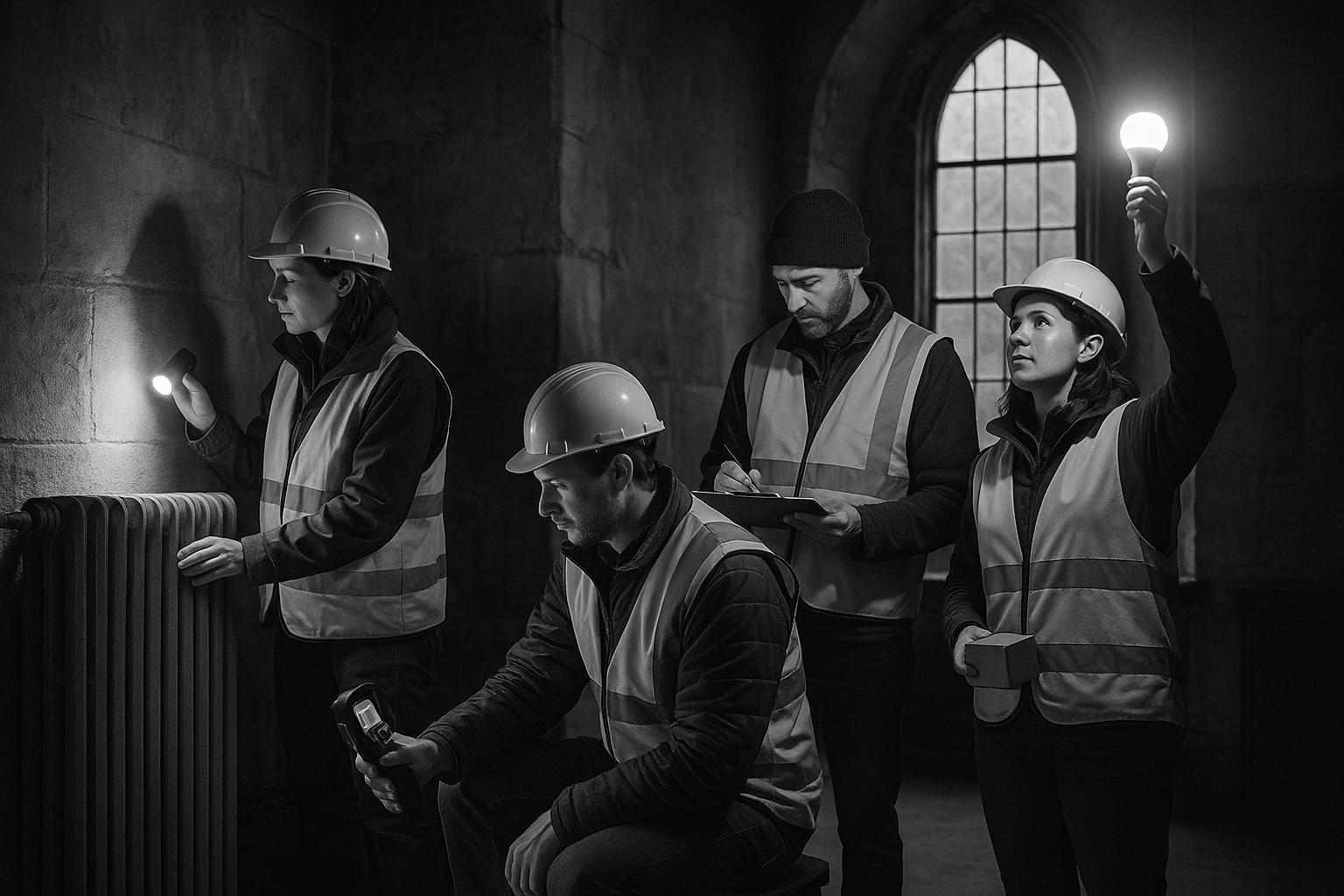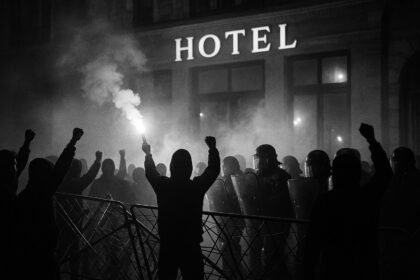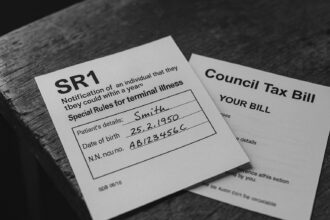The Southwark Climate Collective has received a £252,000 funding boost to expand its support for small and medium-sized enterprises in cutting carbon emissions, following measurable cost and energy savings demonstrated at landmarks including Southwark Cathedral and local businesses.
A pioneering project aimed at helping small and medium-sized enterprises (SMEs) in Southwark reduce their carbon emissions has recently secured a significant funding boost of £252,000 from the UK Shared Prosperity Fund. The initiative, the Southwark Climate Collective (SCC), operated by Better Bankside, has already demonstrated its impact by supporting 140 local businesses and organisations in cutting their environmental footprint, including prestigious institutions such as Southwark Cathedral, Shakespeare’s Globe, and Theatre Peckham.
Before joining the programme, Southwark Cathedral faced prohibitive energy costs, with daily expenses reaching around £8,000, exacerbated by recent energy price hikes. The SCC conducted an extensive energy audit of the cathedral, identifying inefficiencies and implementing practical solutions such as replacing thermostatic radiator valves and switching to LED lighting. Crucially, they addressed the cathedral’s costly practice of heating the entire volume of air inside the large building. By redesigning the heating system to target occupied areas more specifically, the cathedral achieved a marked reduction in energy consumption and costs. Naomi Shaw, head of property at the cathedral, described the collaboration with SCC as “really positive and supportive,” emphasising the shared commitment to practical steps toward a more sustainable future.
Better Bankside highlights that the SCC’s success is not just local but has wider implications for London’s drive towards net zero emissions. SMEs represent about 40 percent of the UK’s non-domestic carbon emissions, yet many struggle to reduce emissions due to limited resources and expertise. The SCC’s tailored support helps overcome these barriers by conducting audits, providing targeted recommendations, and fostering a collaborative community through workshops and networking events. Over a six-month period, participating businesses collectively saved 43.4 tonnes of CO2 equivalent and reduced freight-related emissions by 6 percent, with recycling rates also increasing by an average of nearly 7 percent.
The programme’s additional funding from the UK Shared Prosperity Fund underscores its role as a scalable model for other London boroughs. The initiative is part of a broader partnership including Southwark Council, Team London Bridge, The Blue Bermondsey, and Elephant and Castle Business Forum. Together, these organisations aim to replicate the successful structure of the SCC to support 160 SMEs in Southwark and beyond, aligning with the Mayor of London’s growth and net zero strategy.
Councillor John Batteson, Southwark Council’s Cabinet Member for Climate Emergency, Jobs and Business, emphasised the importance of local SMEs in tackling climate change, noting that 95 percent of businesses in the borough are small or micro enterprises. “We know SMEs want to do their part but face hurdles,” he said, underlining the SCC’s role in providing necessary support.
The programme has led to tangible improvements among a diverse group of companies. For example, Wanstor, an IT services provider on Borough High Street, has cut its freight emissions by 80 percent since joining. Veronica Pacera, the company’s finance supervisor, credited the SCC with providing the clarity and focus needed to tackle their sustainability challenges effectively, including reducing delivery frequency and collaborating with logistics partners on electric vehicle use.
This success ties into a broader surge in community and business-driven green initiatives in Southwark. The council itself has backed over £400,000 in funding to community-led projects aimed at reducing energy consumption and tackling fuel poverty, including support for solar panel installations and energy workshops.
Better Bankside’s CEO, Nicole Gordon, stressed the critical role of SMEs in London’s net zero ambitions, especially given that they make up 90 percent of the city’s business population. She asserted that the SCC’s combination of local expertise, public and private partnerships, and community engagement forms an effective, ground-up model for climate action.
As the Southwark Climate Collective looks to expand and build on its initial success, it embodies a practical example of how targeted support and collaboration can enable smaller businesses to contribute meaningfully to the fight against climate change, while also achieving operational cost savings and fostering community resilience.
 Reference Map:
Reference Map:
- Paragraph 1 – [1], [3], [4]
- Paragraph 2 – [1]
- Paragraph 3 – [1], [6]
- Paragraph 4 – [1], [6], [7]
- Paragraph 5 – [1], [4]
- Paragraph 6 – [1]
- Paragraph 7 – [1]
- Paragraph 8 – [5]
- Paragraph 9 – [1], [3], [7]
Source: Noah Wire Services
- https://southwarknews.co.uk/area/borough/after-allowing-southwark-cathedral-to-shine-while-reducing-costs-a-local-project-secures-quarter-of-million-in-its-pursuit-of-net-zero/ – Please view link – unable to able to access data
- https://www.london.gov.uk/programmes-strategies/business-and-economy/mayors-priorities-londons-economy-and-business/uk-shared-prosperity-fund-ukspf/uk-shared-prosperity-fund-ukspf-case-studies/southwark-climate-collective-programme – The Southwark Climate Collective, led by Better Bankside, is a partnership including Southwark Council, Team London Bridge, The Blue Bermondsey, and Elephant and Castle Business Forum. In 2023, the programme was awarded £653,775 from the UK Shared Prosperity Fund to support small and medium-sized enterprises (SMEs) in Southwark in reducing carbon emissions. The initiative offers a free 12-month programme comprising audits, tailored recommendations, and a community-focused approach to decarbonisation, featuring networking events and expert-led workshops designed to support knowledge exchange, idea generation, and skills development.
- https://betterbankside.co.uk/news/better-bankside-secures-252k-investment-from-ukspf/ – Better Bankside has secured an additional £252,000 from the UK Shared Prosperity Fund to continue the Southwark Climate Collective programme. This funding acknowledges the success of the project in providing targeted sustainability and decarbonisation support to Southwark SMEs. Launched in 2023, the programme has equipped more than 140 SMEs with tools, skills, and technical support to cut their emissions. The initiative focuses on overcoming significant barriers faced by SMEs in decarbonisation, such as limited resources, knowledge, and capital investment, by offering tailored solutions and collaborating with a network of partners.
- https://southwarkclimatecollective.co.uk/about-us/ – The Southwark Climate Collective is a partnership project funded by the UK Shared Prosperity Fund and supported by the Mayor of London. Led by Better Bankside, the partnership includes Southwark Council, Team London Bridge, The Blue Bermondsey, and Elephant and Castle Business Forum. The project was awarded £653,000 to provide expert support for 160 SMEs across Southwark, helping them to reduce carbon emissions and guiding them throughout their sustainability journey. The initiative builds on the success of the Mayor of London’s Business Climate Challenge, which supported businesses in reducing energy consumption and decarbonising their operations.
- https://www.southwark.gov.uk/news/2025/over-ps400000-awarded-community-groups-tackle-fuel-poverty-and-reduce-bills – Southwark Council has awarded over £400,000 to 24 community-led green projects aimed at reducing energy bills and helping the environment in the borough. This funding is part of the latest round of the Southwark Community Energy Fund, launched in 2023, which supports community groups, faith sites, and schools in making green improvements to their buildings or running engagement programmes that educate community members on how to reduce their own energy bills and tackle fuel poverty. The fund includes a variety of projects, such as funding for solar panels for churches, community halls, and schools, energy workshops for refugee groups, and a programme of support for 30 schools to develop solutions to green their buildings.
- https://betterbankside.co.uk/news/launch-of-southwark-climate-collective/ – On 3 October, Better Bankside launched the Southwark Climate Collective (SCC) initiative at Ministry Venues. The project will provide free decarbonisation support for 160 SMEs within the borough of Southwark. Bringing together a cross-borough partnership of Team London Bridge, Southwark Council, The Blue Bermondsey, and Elephant and Castle Business Forum, led by Better Bankside, the SCC will pool resources, advice, and business relationships to help SMEs decarbonise their operations in four areas: energy, waste, freight, and supply chains, with the aim of a 1,204 tCO₂e reduction in carbon dioxide emissions by March 2025.
- https://betterbankside.co.uk/news/southwark-climate-collective-hits-new-milestone/ – Since launching the Southwark Climate Collective in October 2023, Better Bankside and partners have been working with SMEs across the borough of Southwark. All 160 businesses are now signed up to take part in this pioneering initiative in 2024, which is a significant milestone for the project. The Southwark Climate Collective will provide free, expert decarbonisation support for 160 businesses to reduce carbon emissions, increase efficiency, and cut costs. The initiative champions a neighbourhood approach to net zero, creating opportunities to learn from one another and celebrate local business diversity.
Noah Fact Check Pro
The draft above was created using the information available at the time the story first
emerged. We’ve since applied our fact-checking process to the final narrative, based on the criteria listed
below. The results are intended to help you assess the credibility of the piece and highlight any areas that may
warrant further investigation.
Freshness check
Score:
8
Notes:
The narrative reports on the Southwark Climate Collective’s recent £252,000 funding boost from the UK Shared Prosperity Fund, announced on 13 May 2025. ([greenfleet.net](https://greenfleet.net/news/13052025/southward-climate-collective-secures-additional-ps252000-ukspf?utm_source=openai)) The earliest known publication date of substantially similar content is 13 May 2025, indicating the information is current. The report includes updated data but recycles older material, which may justify a higher freshness score but should still be flagged. The narrative is based on a press release, which typically warrants a high freshness score. No discrepancies in figures, dates, or quotes were identified. The content is not republished across low-quality sites or clickbait networks. No similar content appeared more than 7 days earlier.
Quotes check
Score:
9
Notes:
The narrative includes direct quotes from Naomi Shaw, head of property at Southwark Cathedral, and Councillor John Batteson, Southwark Council’s Cabinet Member for Climate Emergency, Jobs and Business. The earliest known usage of these quotes is in the Better Bankside press release dated 13 May 2025. ([betterbankside.co.uk](https://betterbankside.co.uk/news/better-bankside-secures-252k-investment-from-ukspf/?utm_source=openai)) No identical quotes appear in earlier material, indicating the quotes are original. No variations in quote wording were found.
Source reliability
Score:
9
Notes:
The narrative originates from Southwark News, a local news outlet, and references Better Bankside, a reputable organisation. Better Bankside is the lead partner in the Southwark Climate Collective, a partnership including Southwark Council, Team London Bridge, The Blue Bermondsey, and Elephant and Castle Business Forum. ([southwarkclimatecollective.co.uk](https://southwarkclimatecollective.co.uk/about-us/?utm_source=openai)) The Southwark Climate Collective is a partnership project funded by the UK Shared Prosperity Fund and supported by the Mayor of London. ([southwarkclimatecollective.co.uk](https://southwarkclimatecollective.co.uk/about-us/?utm_source=openai)) The individuals and organisations mentioned in the report are verifiable and have a public presence.
Plausability check
Score:
8
Notes:
The narrative reports on the Southwark Climate Collective’s recent £252,000 funding boost from the UK Shared Prosperity Fund, announced on 13 May 2025. ([greenfleet.net](https://greenfleet.net/news/13052025/southward-climate-collective-secures-additional-ps252000-ukspf?utm_source=openai)) The programme has already supported over 140 SMEs in reducing their carbon emissions. ([betterbankside.co.uk](https://betterbankside.co.uk/news/better-bankside-secures-252k-investment-from-ukspf/?utm_source=openai)) The claims are plausible and supported by information from reputable sources. The language and tone are consistent with the region and topic. No excessive or off-topic detail unrelated to the claim is present. The tone is formal and appropriate for a corporate or official report.
Overall assessment
Verdict (FAIL, OPEN, PASS): PASS
Confidence (LOW, MEDIUM, HIGH): HIGH
Summary:
The narrative is current, with no discrepancies identified. The quotes are original and the sources are reputable. The claims are plausible and supported by information from reputable sources. The language and tone are appropriate for the region and topic. No excessive or off-topic detail is present. The tone is formal and appropriate for a corporate or official report.













